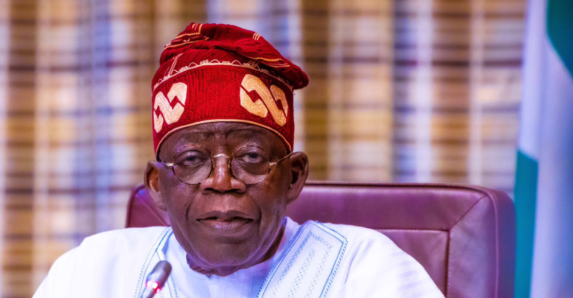>By Sanmi Falobi<
Nigerians are not smiling as the toll of the harsh economic realities is biting harder by the day. Even as the days of the year 2024 run into weeks, the situation does not seem to abate. Central to the hardship is the self-centred and selfish acts of those tasked with ensuring good governance.
The abrupt consequences of the increase in fuel price, occasioned by the removal of subsidy, as announced by President Bola Tinubu during the inauguration ceremony as well as the spiraling of the exchange rate of the naira to the dollar has brought additional woes to the already distressed state of the citizens, with the skyrocketing prices of consumables affecting families, businesses and social life.
… The realities of the unpleasant economic challenges
Mr. Shafiu Abbas, a lawyer based in Kaduna is of the viewpoint that somebody somewhere must be held responsible for the ongoing suffering millions of Nigerians are passing through.

“Nigerians aren’t longer finding it easy to feed their families, to pay school fees for their kids or their medical bills. Some of them have already been evicted from their houses by merciless landlords. Consequently, they have bundled their families back to the villages unceremoniously, because they can’t cope with the urban lifestyle anymore due to the austerity measures taken by the government” he noted, in exasperation.
“The wheels of Nigeria are wobbling. The economy is crumbling. The insecurity is surging and above all, life in Nigeria is life of hell”, he added.
Mrs. Omoyele Oguntade, Assistant General Manager, Opportunity To See Ltd, an Out-of-Home Advertising firm in Lagos, also noted that food inflation, insecurity and dollar exchange rate problem, were the issues plaguing the country, and the masses were most affected. She noted that the dollar exchange rate and fuel price increase created problems for the masses, ‘since it determines our purchasing power and resulted in high cost in transportation’.
According to Mr. Francis Abayomi, Executive Director, Peace and Development Projects, the most daunting challenge for most families is how to keep body and soul together.
“Most citizens are facing the harsh reality of managing scarce financial resources which may not even be available. Those without regular income and who had hitherto been surviving on income from sales and services (like market women and other daily livelihood) now have to spend a lot on transportation. Parents are also going through a lot with school fees payment and other responsibilities at the home front. The cost of food stuff and essential drugs are going beyond the reach of most Nigerians who are merely striving to survive”, he said.
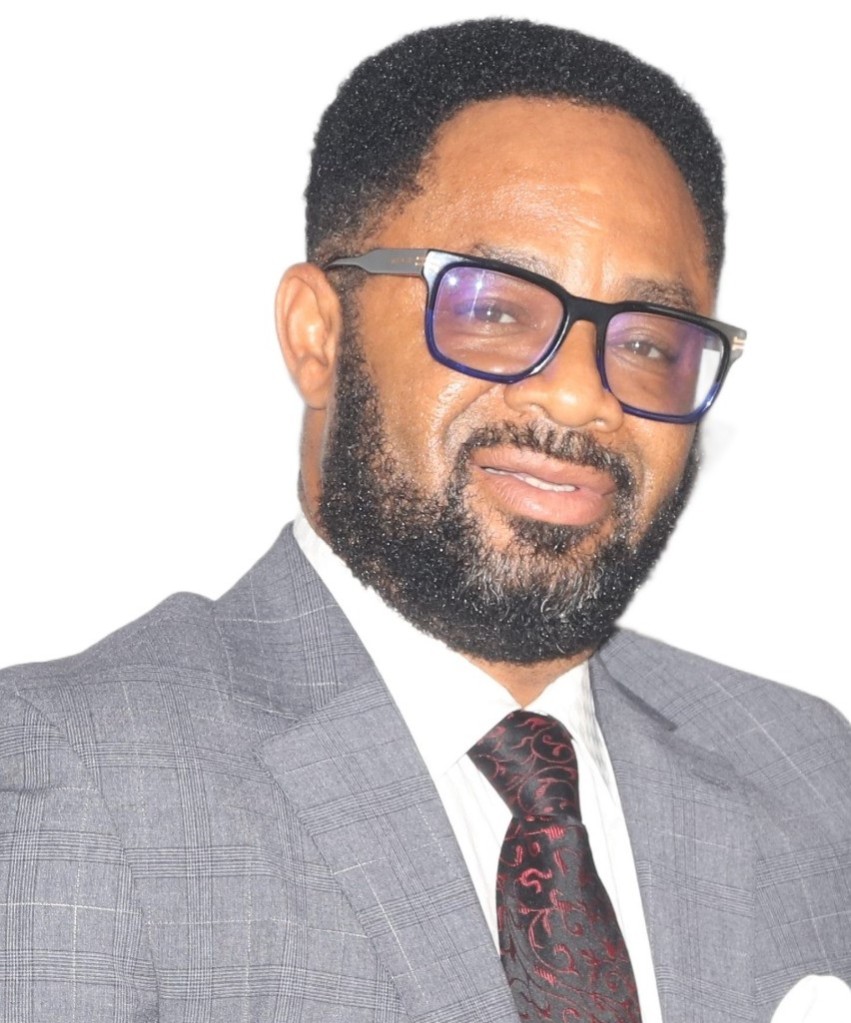
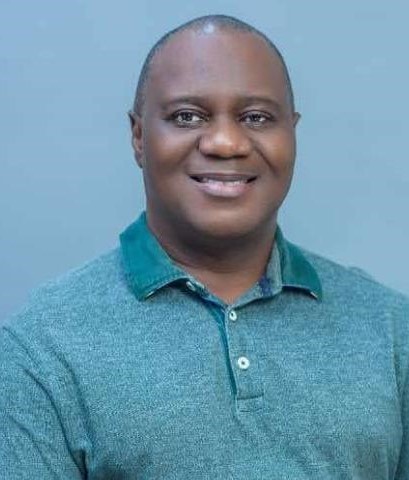

According to Mr. Andrew Mamedu, Country Director, ActionAid Nigeria, the harsh economic realities in Nigeria have led to a significant increase in poverty, with families grappling with reduced income and limited access to essential resources.
“The desperation and frustration arising from these financial difficulties may have contributed to an increase in various criminal activities, presenting additional security challenges for the nation. Disturbingly, many Nigerians are seeking relief from economic hardships by exploring alternatives like relocating abroad, contributing to brain drain in sectors like healthcare”, he noted.
“This economic turmoil has become a major cause of increased violence against women, especially within households, where financial pressures escalate tensions, affecting their safety and well-being. Small and medium enterprises (SMEs) are bearing the brunt, facing closures and staff retrenchments due to inflation and rising business costs”, he added.
Straddling 2023 ‘japa’ slogan, with 2024 ‘no gree for anybody’ catchphrase
Meanwhile, against general assumptions, it’s not all negatives as some Nigerians, who had no prior plan to relocate abroad, suddenly ‘found’ themselves pressed to leave the shores of Nigeria. Despite the economic challenges, year 2023 was a boom year for a select of those who were involved in the visa procurement and airline ticketing sector. Indeed, many Nigerians in the history of the migration statistics left the shores of Nigeria in what has come to be known as the ‘Japa’ slogan, a situation whereby citizens closed down their businesses, resigned from their jobs, sold their properties and committed huge resource to see that they, and their family quickly relocate abroad.
The context of ‘japa’, which actually is a coinage from the Yoruba ethnic group of Nigeria, is a literal connotation that means ‘to flee, ‘to leave a place quickly’ or ‘to leave for good’.
However, the ‘japa’ slogan was more in the form of ‘to leave for good’ and the popularity of ‘japa’ in this context is not only limited to the Yorubas, but to all Nigerians. There are inferences across parts of the country wherein every family had an incident of at least one family member or relative who had sold cars, land, or other forms of properties to ‘japa’ in the context of ‘leaving for good’, as against the norm of travelling abroad for medicals, business, or related such short stay purposes.
According to the United Nations migration body, the International Organisation for Migration (IOM), more Nigerians migrated abroad in 2023 than ever. The IOM Chief of Mission in Nigeria, Mr. Laurent De Boeck, disclosed this at a media parley in Abuja. According to him, no fewer than 260,000 Nigerians approached the IOM for assistance to leave the country in 2023.
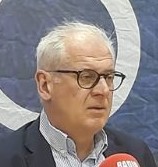
“This 2023 number is the highest number we have ever had”, he disclosed.
“The UK is the number one destination for those 260,000 who came to us. It represents 80 per cent. The rest is the United States, Canada, Australia and some other European countries,” he added.
The ideology of the ‘japa’ flight is general hinged on the desire for a better life, and that remaining in Nigeria was tantamount to living a life of frustration. This ideology rests well with those who have the means or resources (a landed property, cars or some investments) to trade-off to fund their ‘japa’ adventure. With the growing insecurity and the failure of the systems, ‘japa’ became an attractive option for those who could afford it, especially for those in active life, in their 30’s, 40’s, 50’s or thereabout. In some instances, where parents are not able, they commit funds for their children’s aspirations to ‘japa’
However, in a twist of events, year 2024 was heralded with a new slogan for those who hadn’t the resources to embark on any ‘japa’ adventure. Like a self-consolatory drive, 2024 was welcomed with the ‘No Gree For Anybody (NGFA)’ slogan. Although the origin of the slogan is not very clear, it was seemingly popularised on social media through music videos and skits with ‘No gree for anybody’ as title or sub-title on youtube. The released of a music video of the song with the same slogan which was uploaded to youtube by Nigerian comedian, singer and performer, Josh2funny as well as another version done by another Nigerian singer-songwriter, Spyro, also on youtube and in Mp3 across many music streaming platforms, buoyed the slogan.


Skits by Mr. Macaroni and Broda Shaggy, among others, also boosted the ‘No gree for anybody’ slogan as it became viral, with many other artists and skit makers quickly releasing versions in songs, skits or comedies. As such, the ‘No gree for anybody’ slogan became popular, particularly among the youth and a vast majority of netizens, who adopted it as a spur in overcoming or countering whatever limits come with the new year.
The rapid spread of the ‘No Gree For Anybody’ catchphrase which can be loosely translated to mean, “do not allow yourself to be bullied by anyone” or “do not tolerate any form of nonsense from anybody” or “do not allow anyone cheat you or deprive you of your privileges” seemingly fits as the impetus that Nigerians need to start the new year.
The new wave of the ‘No gree for anybody’ slogan was therefore embedded in the obvious context that, if ‘japa’ was not possible, let nobody add to the stress and frustrations already being faced!
The context of ‘No gree for anybody’: good or bad?
Despite the rising popularity of the NGFA slogan, the Nigeria Police have warned that there are negative tendencies that the ‘No gree for anybody’ slogan portends in that it could also translate to mean resistance to instituted authorities which may lead to break down of law and order.
During a press briefing in Abuja, Mr. Muyiwa Adejobi, the Nigeria Police Force spokesperson, warned that intelligence reports show that the catchphrase was capable of plunging the country into a crisis, describing it as dangerous and capable of triggering crisis across the country.

According to Adejobi, although the catchphrase is being seen as “normal talk”, those in the security community view it as a “dangerous” slogan.
“No gree for anybody has been seen as normal talk, but in the security business and the security community, we have seen it as a very dangerous slogan that can trigger crises”, he said.
“We have been informed from our intelligence that this slogan is coming from a revolutionary sector that may likely cause problem across the country”, he added.
However, while the view of the PPRO might have been informed from a sense of security consciousness, the ‘No gree for anybody’ slogan is like a coin of two sides. While caution should be exercised, as advised by the Police, same of which is being echoed in religious circles, the NGFA can also be used as a motivation to proactive positive actions.
For example, the Nigerian Army’s Director of Defence Media Operations, Major-General Edward Buba, while addressing the press, used the slogan in a motivational way.

While calling on Nigerians to do anything in their capacity to prevent terrorists from tormenting them in 2024, he used the catchphrase to drive home his message.
“No gree for terrorists. No gree for perpetrators of insecurity”, he said.
“Make Nigerians no gree for terrorists this year. You see something, you say something … and we shall do something,” he added.
Similarly, it was reported that the governor of Lagos State, Mr. Babajide Sanwo-Olu, in a motivational message to the Super Eagles over the 2024 African Cup of Nations, urged the team not to “gree for anybody” but to bring the cup home.
Whichever way the ‘No gree for anybody’ slogan is interpreted, it is undeniable that Nigerians needed something to spur and galvanise them to hope for a better year in the reality of the past and present economic woes and needless hardship and sufferings that Nigerians have experienced and are experiencing.
Nigerians are not smiling, families are going through tough times
When Dave and Janet married few years ago, they had looked forward to having a blissful and prosperous life. Dave who is a marketing executive in one of the Advert branding firms in Lagos could be said to be comfortable, a status complimented by Janet, his wife who works as an admin staff in a micro finance bank. However, over the past months, issues of finance for running the affairs of the family is becoming a threat to the bliss of their home.
“I can’t afford that now”, Dave, 35 said to his wife, with concealed anger as he packed his laptop bag to go to work. “But, you know this is a great opportunity and it is a good purchase”, replied his wife Janet, 32, resolutely. “Just bring Thirty five thousand naira and I will add the rest”, Janet offered.
Not wanting to aggravate the matter and widen the brewing hostility between him and his wife, Dave, glowering gave a reply with some firmness as he stepped out, “okay, I will see what I can do by the end of the month”.
‘Why end of the month, today is just 11th and the promo is ending this week”, Janet said sullenly, in what seems to be a final attempt for the husband to succumb to her request.
Indeed, for almost three months now, Dave has not been able to give his wife money to buy a washing machine for the family’s use. Actually since the birth of their second child, four months ago, things have not been easy for Dave. The reality for Dave is that the increasing expenses in running the family is making life tough for him. While he is grateful to his wife, who helps out, buying the children clothes, shoes and other related items as her own support to the family upkeep, the reality for him is that he is really getting choked up financially. The reality for him is how to deal with the pressure associated with the fact that while his salary or income level has not increased, he has to cope with issues like buying a washing machine, apart from other demands of tokens of financial responsibilities to his siblings, his parents, paying the house rent and having to have some funds kept aside to fuel his car!
… There is pressure everywhere!
Beyond social and family pressures, work-life demand also presents additional pressures to sustainable living and livelihood. This affects both men and women.
For example, media report has it that a 32 years old female employee of a bank in Ikorodu, Lagos, committed suicide just few days into the new year. According to media report, the bank employee, by name Amarachi Ugochukwu, was said to have drank an insecticide and locked herself up in one of the restroom of the bank. In the suicide note discovered when the door was forced open, the lady blamed the harsh economy realities for her decision to end her life, saying nothing was working well for her.
“Nothing is working in my life. My figures are low. My brain is clogged up. The economy is getting harder. My decisions are wrong. My mind is messed up. The future doesn’t seem bright at all. I see extreme hardship. I can’t bear the pain anymore,” she wrote in the suicide note. It was reported that Ugochukwu apologise to her parents and other members of her family, mentioning names that were perhaps that of her siblings or loved ones. “I’m sorry mum, I’m sorry dad, I’m sorry Nene, Okwe, Toto, Nazor, Chuchu, Ifunanya,” she added. According to the report, her suicide note ended with, “Dear Lord, have mercy on me!”

The LinkedIn profile of Ugochukwu described her as ‘Relationship Manager’ with the bank (name withheld) which she joined in May 2023. The profile also showed she was a Retail Marketer with another new-generation bank between March 2020 and April 2023. Previously, she was a part-time Sale Consultant to another firm.
Meanwhile, though Ugochuckwu’s case may have been made popular due to the fact that the suicide happened in a public place and got media attention, it cannot be ruled out that there are many other cases of economic-induced suicides happening that are never reported or that may still happen and never brought to public attention.
When and how did things start getting worse?
Nigeria’s economic challenge seems to be on permanent degradation, with each year appearing worse than the previous. The foundation of the issue rests on corruption and bad leadership, which has plagued Nigeria over the years.
According to the executive summary of the 2019 Poverty and Inequality index by the National Bureau of Statistics (NBS), 40.1% of the total population of Nigeria were classified as poor. This translates that in 2019, about 82.9 million Nigerians were poor with an indicative inference that an average of 4 out of 10 Nigeria has real per capita expenditures below 137,430 Naira ($381) per year.
Between 2019 and now, the situation had grown worse. The highlights of the NBS 2022 Multidimensional Poverty Index survey revealed that 63% of persons living within Nigeria (133 million people) are multi-dimensionally poor, as against 40.1% (82.9 million) of the total population of Nigeria were classified as poor in 2019.
In a related development, an independent comparative analysis of the NBS unemployment rate by Twentyten daily reveals worsening situations. According to the analysis, while Unemployment rate was 10.4% in 2015, it rose to 14.2%, 20.4%, 23.1% and 33.3% in years 2016, 2017, 2018 and 2020 respectively. The poverty level became 37.7% in 2022 and was estimated at 40.6% for year 2023.
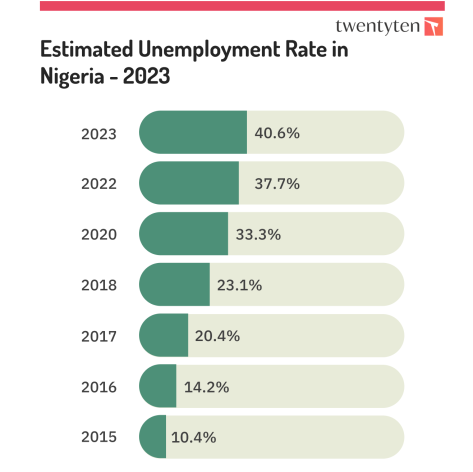
Meanwhile, beyond individuals, many businesses have also been adversely affected by the dwindling economic fortunes of the country, with many professionals thrown into out of job, which invariably has led to increasing the hardship on families.
It is estimated that about 10,000 top paying jobs were lost in 2023 as a result of notable multinational companies shutting down their production factories in Nigeria.
Among multinationals that shut down operations in Nigeria in 2023 include Unilever Nigeria (home care and skin cleansing division) and Procter & Gamble (P&G), the world’s largest personal care and household products company. Others include top global pharmaceutical giant, GlaxoSmithKline (GSK), French pharmaceutical company, Sanofi-Aventis, Bolt Foods, and top Energy firm, Norwegian behemoth Equinor.
Many other business also shut down operations. The list includes Mayor Biscuits Company Limited (MABISCO), Jumia Foods, Okadabooks and Jubilee Syring manufacturing company, among others.
Harsh economic realities: President Tinubu, the issues and the way out
While opinion varies in respect of the suffering being experienced, there is a common agreement that it is the responsibility of those elected into political offices to solve the nation’s problems, irrespective of whether it was inherited from past administrations.
Professor Justice Ngwama, President, Institute of governance and Management, alluded that the economic crisis plaguing Nigeria is due to lack of effective planning by those elected. He noted that while President Tinubu’s administration is relatively new, he started on a bad note.
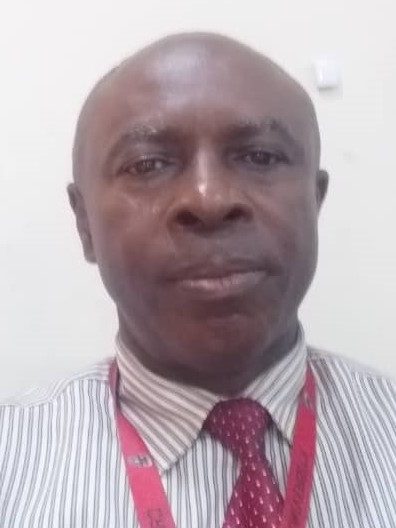
“Tinubu’s administration is relatively new, we can’t write him off for now, however, he started on a bad note because he had no clear cut economic agenda/programme to cushion the economic hardship created by his APC previous administration” he told SDNonline.
According to him, the fuel subsidy question that has paralysed the masses and the make-up palliatives that are laughable which had characterised APC regimes, where they claimed to go from state to state to distribute money without records was the same line that Tinubu decided to tow, by giving out money to citizens instead of investing in critical areas that will help the economy, create jobs and businesses.
The university don noted that there wouldn’t’ be any leeway, except things are done differently.
“The masses are still feeding the politicians through tax regime of this administration. So what is the hope of a common man?” he queried.
“Nigeria needs sound economic policies that will address critical infrastructure, reduce corruption and spending. The issue of security is staring at all of us. Some people appear to be benefiting from the situation as economy is looted via security budgets. Tinubu should run an inclusive government rather than government of Western Nigeria.
“He must stop borrowing and maximize the resources of Nigeria” Prof. Ngwama said.
Engr. Adisa Momoh, Engineering Consultant, Adonis Consulting, Lagos, is also of the opinion that President Tinubu should have done much more in terms of appropriate economic policies to address the tough times Nigerians are facing.
“… During the campaign, Tinubu promised us in his ‘Renewed hope agenda’ that he is committed to guarantee us adequate security, buoyant economy with the provision of jobs for our teeming youth population and the revitalisation of our agriculture to ensure adequate food supply at affordable prices. In the area of economy, the announcement of the end of subsidy on inauguration day without making provisions to alleviate the negative consequences have brought untold hardship to the general populace.
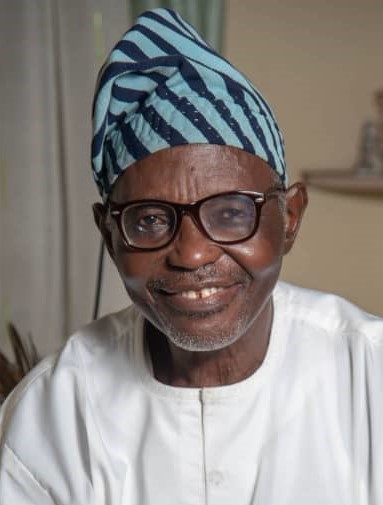
“The net effect of this is that all petroleum products and basic food prices have skyrocketed and beyond the reach of most Nigerians. The palliative measures that the government later introduced have not gone far enough. My overall assessment of the government performance so far is poor”, Momoh noted.
According to him, over the past months, terrorism. Banditry and kidnapping had increased.
“We have seen terrorism, banditry, kidnapping on the increase. The government could not curb them as they are at a loss of what to do”, he added.
Better days ahead, government promises.
Meanwhile, the federal government of Nigeria has reiterated its commitment in seeing that there are better days ahead for Nigerians, as evident in the New year message to Nigerians by President Bola Tinubu.
“Everything I have done in office, every decision I have taken and every trip I have undertaken outside the shores of our land, since I assumed office on 29 May 2023, have been done in the best interest of our country”, Nigeria’s President, Bola Tinubu said.
While acknowledging that he has had to make difficult decisions that have brought suffering to Nigerians, the President explained that some of his decisions, such as the removal of subsidy on petrol, would have brought “fiscal catastrophe” to Nigerians if he had not taken them.
His words:
“Dear Compatriots, take this from me: the time may be rough and tough, however, our spirit must remain unbowed because tough times never last. We are made for this period, never to flinch, never to falter. The socio-economic challenges of today should energise and rekindle our love and faith in the promise of Nigeria. Our current circumstances should make us resolve to work better for the good of our beloved nation. Our situation should make us resolve that this new year 2024, each and everyone of us will commit to be better citizens”, he added.
The President in the course of the speech thereafter attempted to explain some of his administration’s efforts in the saddle of power.
“Since our administration took over the mantle of office, security has improved. Silently, we have worked to free captives from abductors. While we can’t beat our chest yet that we had solved all the security problems, we are working hard to ensure that we all have peace of mind in our homes, places of work and on the roads”, he said.
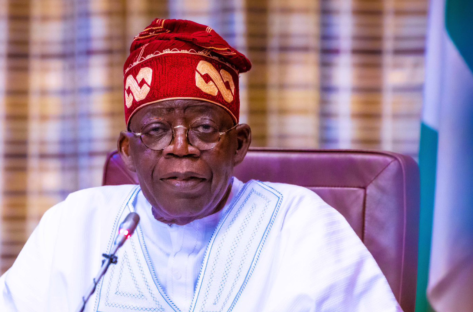
According to him, his administration will work diligently to make sure every Nigerian feels the impact of the government.
He noted that he remained committed to good governance.
“I took an oath to serve this country and give my best at all times. Like I said in the past, no excuse for poor performance from any of my appointees will be good enough.”
He also called for the support of the citizens.
“For the new year to yield all its good benefits to us as individuals and collectively as a people, we must be prepared to play our part. The job of building a prosperous nation is not the job of the President, Governors, Ministers, Lawmakers and government officials alone. Our destinies are connected as members of this household of Nigeria. Our language, creed, ethnicity and religious beliefs even when they are not same should never make us work at cross purposes.
He reiterated the need for citizens’ support.
“In this new year, let us resolve that as joint-heirs to the Nigerian Commonwealth, we will work for the peace, progress and stability of our country. I extend this call to my political opponents in the last election. Election is over. It’s time for all of us to work together for the sake of our country.
In his concluding statement, the president was philosophical in birthing a glorious dawn.
“We must let the light each of us carry – men and women, young and old- shine bright and brighter to illuminate our path to a glorious dawn”, he said.
Beyond rhetorics, what can be done to cushion the reality of the anguish, anger and hunger?
According to Mr. Andrew Mamedu, Country Director, ActionAid Nigeria, in order to tackle the nation’s economic challenges, “the federal government must conduct a thorough reassessment of economic policies, placing emphasis on the effective implementation of social investment programmes. Simultaneously, a resolute effort to combat corruption is essential, and President Bola Tinubu’s anticorruption stance should be clearly communicated through spoken words, written statements, and demonstrated in his body language.”
He also noted that “both federal and state governments should actively tackle unemployment by creating a conducive environment for creation of employment and promoting self-employment through supportive policies.”
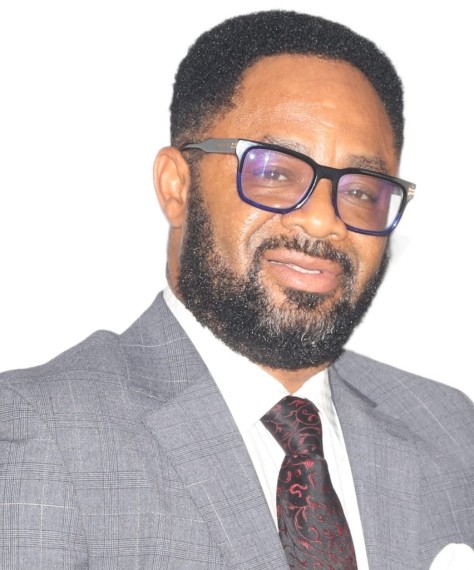
Explaining further, he noted that “Addressing the high cost of doing business is crucial, with incentives like tax holidays and tax rebates for small and medium enterprises (SMEs) recommended, alongside fair taxation for multinationals. Additionally, the pervasive issue of multiple taxation, hindering businesses and productivity, needs systematic resolution through streamlined processes for a conducive economic environment. Now is the time for the government to prioritise investment in the social sector, enhance monetary and fiscal measures to mitigate inflation, boost foreign exchange availability for effective business operations, and ensure the availability of low-interest loans for small and medium enterprises (SMEs) and mortgages.”
He noting that “amidst this difficult period, ActionAid remains committed to supporting the poor and excluded, advocating for policies that alleviate economic burdens, and supporting programmes that promote resilience and sustainable development”.
Mr. Francis Abayomi, giving his perspective as a development expert noted with regret that though the President Bola Tinubu administration means well, it was rather unfortunate that the social intervention programme has not be effectively managed to give the much-needed support to households that are in dire need.
“A lot still need to be done in providing support to Nigerians to alleviate the hardships most household heads and breadwinners are going through”, he noted.
“Beyond interventionist programmes aimed at alleviating poverty in the short run, there is the need for subvention or grants for market women and other categories of livelihoods to stimulate economic activities, create employment opportunities and assist sustainable livelihoods activities with funds to survival in the interest of business”, he added.
Meanwhile, beyond attention on government, citizens are also urged to re-structure and re-adjust to the realities.
“To cushion the effect of these high costs (of living), I advise people to be more intentional about their food”, Mrs. Franca Okpiaifo, an education consultant noted.

“Make your food your medicine. Eat more Vegetables with your carbohydrates. Cut out the junks. Eat the fruits you can afford regularly. Joining with your friends to buy foodstuff in bulk and sharing such can reduce the amount you spend on food”, she added.
“Getting a health insurance is also very helpful. Stay in houses you can afford. Take care of your mental health. Take one day at a time and finally and stay out of debt”, she advised.

